Don't wanna be here? Send us removal request.
Text
I’M ALIVE
Oh hey friends! It’s been awhile. This is my “touching base” post, where I briefly explain what happened to me. I got a day job. But I’m quitting that soon, so I’ll have time to post again! Yay! I look forward to dumping more thoughts on you lovely supportive people soon. Until then, Merry Christmas! Don’t worship Santa [aka the father of lies]. Also, here’s a picture of an espresso machine I decorated a long time ago.

#I didn't die#Quite the opposite probably#boy do I have a tale to tell#and that I shall#it is whale it is whale with my soul#*rhyms with shall and tell#sorta#See you next month!#seriously I'm not friends with Santa#I've been ranting about it in the shower for weeks#but I'll explain that after the dust settles#Then you'll have a whole year to repent#I mean think about it!#Okay ima dig myself OUT of this hole#KBYE
1 note
·
View note
Note
wats ur favorite verse
Every once in awhile I have a new favorite...or more precisely, I find one which speaks to me more profoundly in whatever chapter of life I’m in. There’s SO MANY I could mention!! The most recent one that comes to mind is in John 6, verse 27. It says, “Do not labor for food that perishes, but for the food that endures to eternal life, which the Son of Man will give to you.” He said this to his 5000 followers in the desert, right after he fed them all supernaturally. To put it simply, Jesus feeds His followers. When you build your life on His word, by walking with him humbly and believing what he says, He takes good care of you. I think he means it literally. He will give you food for the body and food for the soul, and I say this because he demonstrated both through this miracle. He is all sufficient for your life. I could go on and on about what it’s done in my heart, so here’s the short version. I was without a job for 5 months. He took care of me. He fed me. And not only did He feed me, but He paid my bills. And not only did He pay my bills, but He spoke to me about my identity, about His will for my life and His ultimate purpose for me, and about how I can start reaching the lost. His word was, and is, life to me. John 6:27 sticks out as the most concise verse, among many, that has guided me through a season of trust, surrender, and active faith.
1 note
·
View note
Text
“Who’s Fault is it Anyway?” The Blame Game!!
Spoilers: It doesn’t matter! Let’s be honest. Sometimes, (pardon my language) life just sucks. Naturally, when things go wrong we want to find out why. In small settings, such as finding out which co-worker ate your lunch or disciplining the correct child for leaving legos foot-wreckers on the floor, that tendency can be noble. We want to find out where and why the problem started so we can fix it; We play the Blame Game! But while the world certainly could use more children who clean up their own legos, nobody actually wins the Blame Game.

When faced with real and challenging issues in life we often turn to the Blame Game as the easiest way to deal with deep, unresolved pain: She made me do it! It’s her fault for being controlling; My alarm clock didn’t go off; It’s my boss’s fault, he doesn’t pay me enough; It’s the devil’s fault for tempting me; It’s my dad’s fault for not being there. The list goes on. It’s just easier to offset our pain by making it someone else’s problem, an attitude that’s run in the family since the beginning. [See Genesis 3] Sometimes we blame satan: If he just hadn’t tempted me, I wouldn’t have sinned; If he hadn’t caused that guy to be an alcoholic, the crash never would’ve happened; The devil sent that disease; He made me lose my job; He’s making me depressed; etc. When we do that, we either become helpless prey to the big bad wolf, or we embarrass ourselves by shadowboxing imaginary devils everywhere. While I’m certain that this wicked being initiates all sorts of trauma and heartache, making him the focus results in ascribing to him more power than he has. Then we end up with more faith in the devil than in God. Bad plan. Sometimes we blame ourselves: If I had just said what I needed to say, she wouldn’t have left; If I had just worked harder, my business wouldn’t have tanked; If I had just been stronger, he wouldn’t have hurt me like that; If I was more handsome, I wouldn’t be so lonely; if I was a smarter kid, my parents wouldn’t have separated; If I was born the other gender, my mom wouldn’t have said those things. This heart-wrenching category of shame is terminal. It kills. Thinking this way turns you into the source of the problem, the victim of the problem, and ultimately the solution to the problem. Spoiler alert, it’s a trap. There’s no jailbreak when it’s “all your fault”. I’ve struggled with versions of this and let me tell you, blaming yourself never results in anything good, or hopeful, or true. Finally, we sometimes end up blaming God for either causing bad things to happen (which makes him sadistic, manic, and untrustworthy) or allowing bad things to happen (wherein he’s guilty of negligence, or he’s aloof, or he’s simply not as powerful as he claims). I don’t have time here to unwrap the nasty layers of this ‘lil stinker, but for now let’s suffice to say that it isn’t God’s fault, and even if it was blaming him doesn’t help. To put it bluntly, only victims play the Blame Game. You can play all day if you want, but you'll never heal the hurt or solve the problem that way. In fact it will make things worse.
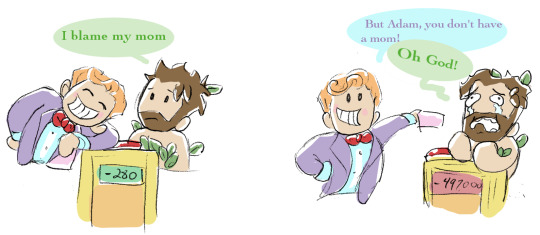
So what then? How do we re-process painful experiences in life if we can’t default to blame? How do we get our legos cleaned up? Let me tell you!
Jesus initiated his ministry by proclaiming his messianic mandate, his “royal agenda, with these beautiful words: “The Spirit of the Lord is on me, because he has anointed me to proclaim good news to the poor. He has sent me to proclaim freedom for the prisoners and recovery of sight for the blind, to set the oppressed free, to proclaim the year of the Lord’s favor.” [Luke 4] No matter the source of your hardships, Jesus wants to be the solution. He wants to replace the casualties of circumstance with comfort, healing, redemption, forgiveness, hope, joy, freedom, love, and favor. He offers his death on the cross and resurrection from the dead to you as a “get-out-of-jail-free card”, and with it comes the closure and healing you’re looking for. Stop playing the Blame Game. It doesn’t matter who’s fault it is. Jesus is the solution, and if you seek him, you will find him. This is a sort of messy introduction to a larger topic. More thoughts pending! Stick with me. :)
#The Blame Game!#Who's Fault is it Anyway!?#Illustrated#it's a Your mom joke#sort of#middleschool humor#lol#poor Adam#So I got a job!#And went back to school#So my time has been limited for blogging#I'll do my best! :D#Happy Wednesday!#Intro topic#heavy topic#Abrupt ending...I realized this is gonna have to be a multi-post.#Seriously tho don't leave legos on the floor#foot-wreckers#WHY ARE MY PICTURES FUZZY!?#Grrr...
1 note
·
View note
Text
What is “Prophecy”?
This is a scary word for some people! But it doesn’t have to be. Prophecy has been used and abused by well-intentioned (and many not-so-well intentioned) folks for as long as it’s been around (aka, always). In fact, I’ve heard horror stories about how prophecy has been used for manipulation, condemnation and shaming, promiscuity, greed, power, corruption, etc. Trust me, I’m well aware of the atrocities, and definitely aware that its driven people away from the things of God, which breaks my heart. I have good news! A tool used incorrectly doesn’t make it a bad tool. Believe it or not, there is a right way to approach Prophecy. In my circles, the topic comes up frequently so that its just a normal part of life. I don’t think it’s necessary to apologize for it or come up with a more palatable word for it. We just need to define it and demonstrate it well.

What is it? In it’s simplest form, Prophecy is what happens when God communicates to us and we communicate that to someone else. Since Jesus is the Word of God [John 1:1 & 14] its in His nature to communicate with us. At some point I’ll lay out a more comprehensive biblical foundation for the premise that God still speaks, but for now suffice to say that if God wants to talk to you (and he does) then he will! And he does! God will speak to us through his written word (the Bible), through the Church (sermons, testimonies, etc), through impressions and feelings in our heart and mind (pictures in our imagination, “gut feelings”, and “feeling” feelings, etc), sometimes even through circumstances. He’s not short on ways to get a message across to us. Whenever we tell someone what God is saying, it’s prophecy! It’s just like giving someone a little love note from Him. “Hey friend, I felt like God wanted to tell you just how much he loves you!” Boom. It’s not weird, it’s not “oogly boogly”, it’s not mysterious or cultish or hyper-spiritual, and it is definitely not just for “those weirdos”. It’s one of the ways we interact with a relational God, and everybody who is in relationship with Jesus can (and should) participate. What’s it for? There’s some discussion about exactly how it works and what it’s for, and we may get into the nuances later. The basic purpose of all prophecy (Old Testament and New Testament) is to connect people to Jesus by revealing who He is [John 15:26, Eph 1:17-18, Rev 19:10]. Jesus, and everything He says, is loving, encouraging, comforting, convicting and guiding [1 Corinthians 14:1-3, John 16:7-11]. So healthy prophecy will always point to the character of Christ and result in encouraged, comforted, convicted and guided people. And if that’s the goal of prophecy, every christian should want to learn more about this. We all need encouragement, comfort, conviction and guidance sometimes. So why not prophesy? It’s a wonderful tool that God has given us to love people, and to reproduce His love and character in people’s lives. No need to “throw out the baby with the baptismal water,” right? (….that is a terrible analogy, who says that?) What it’s not Like I said, I’ve heard the horror stories. Prophecy is NOT about: -Predicting the future -Gaining money or influence -Being powerful, impressive or “spiritual” -Being 100% accurate -Uncovering sins or sore spots -Talking to, or battling, demons and spirits -Manipulation or control -Having a title -Or being weird just to be weird (which happens).
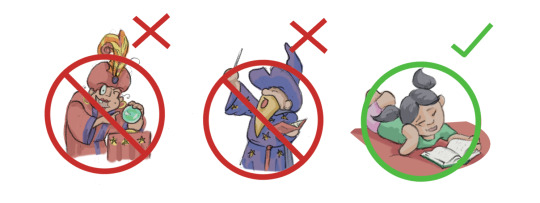
Again, the goal is to connect people to Jesus. We want people to have more faith in God as a result of our prophetic messages. They should walk away feeling encouraged, comforted, hopeful, relaxed, and excited to know this man better. When we prophesy, we have a responsibility to be respectful, dignified, gentle, open to correction, and overall having the character of Christ because it’s about showing people who Jesus is, not about showing off [James 3:13 -18]. I plan to post about some prophetic experiences I’ve had, both good and bad, so I wanted to lay a framework for what I mean when I use that word. If it strikes a chord or raises a red flag, let me know! I’d love to talk about it.

In the meantime, don’t let prophecy, or the people who use it, freak you out. There are genuine and healthy leaders in the church who utilize this tool of compassion and love because they want God’s best for you. And among the incorrect ways there is absolutely a correct way to think about and take part in this expression of knowing Jesus. I encourage you, like Paul did, to “eagerly desire the gifts of the Spirit, especially that you may prophesy”! [1 Corinthians 14:1]
#Yes everybody can do it#Prophecy#Many many verses#I love prophecy#It's so encouraging!#Knowing what God says about you is awesome#Everybody should want this!#Abusing a tool doesn't make it a bad tool#It means you treat it with respect#and learn how it works#and what it's for#And trust your leaders in the Church to keep it from getting crazy#Another HUGE topic#Stick with me! It'll be great#Leaven#Happy Thursday
1 note
·
View note
Text
To Be or Not To Be
Let’s take a look at a picture of a quarter.

You’ve probably both seen these and spent these here and there throughout your life. On one side of this quarter we can see a face, we see writing, etc. No matter what you notice about this side of the quarter, you’ll probably agree that it’s worth 25 cents, a “quarter” of a dollar (which may be enough money to fill one of your tires with air...sometimes). Let’s look at the other side.

Same quarter, totally different picture, different writing, etc. But it has the same functional value as it did when we were looking at the first side. It’s still 25 cents, and I can still use it to buy things (like air). At the end of the day, both pictures represent one and the same thing, not two separate contradictory things. I believe the Church has unnecessarily created false theological paradoxes which lead to confusion, division, and even great fear within the body of Christ. It should not be so!! For example, some have envisioned a contradiction between God’s justice and his mercy, saying “a merciful God would never allow sinners to be punished for their sins”. Even though that’s not true [our example of the synonymity of justice and mercy is in the Cross: He justly applied punishment to sin while mercifully bearing it on our behalf so that sinners don’t have to], the intellectual distinction between justice and mercy makes an error which skews the truth. The truth isn’t the problem. There’s no paradox in God because He’s not two separate things at odds with himself. There is no “balance” in God because He’s not made up of multiple things that need balancing. God is one; He’s wholly united in himself, with himself, and there’s no contradiction in Him [James 1:17]. We don’t have to find some mysterious “balance” when it comes to the truth, we just have to see and believe what’s true. If I perceive a contradiction, the problem is on my end. It happens when we look at spiritual things through unspiritual lenses. [John 3:3-12, 6:63 and Romans 8:5-8]. Both sides of the coin represent the same thing, even though it looks different from different angles. That would be enough for its own blog post, but I’m going to continue. (Two-in-One post! Woah!) I want to apply this concept to the discussion of salvation. The classic Predestination dichotomy (A can of worms!! Oh boy...here we go). Does God choose us, or do we choose him? Which side of the coin do we spend? This discussion has literally divided church bodies (including that of my teenage years) and set denominational boundaries that don’t need to exist because we’ve made an intellectual distinction between free will and God’s sovereignty. How silly (and wrong). Here’s why this is important. I’ve had too many discussions with wonderful people who struggle with legitimate fears about their personal salvation: “What if God didn’t choose me?”, they ask. “What if He saved me, but I mess up and get unsaved? What if I thought I was saved but really I’m not? How do I know either way?” Yikes! Where do these fears come from? Jesus made it pretty clear how this works. I think these fears stem from useless and confusing teachings about one or the other “side” of the salvation coin. So for the sake of length, I’ll just outline the bare-boned simplicity of how Jesus preached the sureness of salvation: If you follow Him, He will feed you. [John 6:35] If you confess Him, He will embrace you. [Matthew 10:32] If you draw near to Him, He will draw near to you. [James 4:8] If you reject Him, He will reject you. [Matthew 10:33] If you seek Him, you will find Him. [Matthew 7:7-11] If you repent, He will honor you. [Luke 15:11-24] If you obey Him, He will answer your prayers. [John 9:31 & 14:21] If you love Him, He will make his home in you. [John 14:23] And if you believe in Him, you will be saved. [John 3:16-21] If you do your part, He’ll do his part. He offers you a gift that only He can give, then it’s up to you to receive it and live it out. And if you make a mistake, fear not! Sin doesn’t keep us from God, stubbornness does. Jesus already paid the penalty for your sins. If they couldn’t stop Jesus 2000 years ago then they certainly can’t stop Him now. He knew what he was getting into. Just repent, nail that sin to the cross, (or “flush it” as I like to say”) and keep pressing on towards Jesus who has already forgiven you for it [Philippians 3:13-16]. Boom! Easy. You’re still saved! Yay! So have no fear! It really is that simple. If you believe what Jesus said, your salvation is secure in Him. [See 1 John 3:19-24, 1 Corinthians 1:1-9, Jude 15, Philippians 1:6, 2 Corinthians 1:21-22, and John 14 and 15 for even more biblical context and support].

Don’t create a paradox where there is none. There may be two sides to this coin, but it’s not one or the other. At the end of the day it spends the same way anyway: If you follow Jesus, He’ll take care of the rest, both now and forever. (And he’ll even put air in your tires when you need it.)
#SO MANY VERSES#HUGE topic#couldn't cover everything#I worked at a bank for 2.5 years#money talks#False Theological Paradoxes#are unnecessary and unhelpful#One God#One Truth#One Spirit#One Jesus#who died for our Sins#that whoever believes in him#will be saved#It's not that complicated#Just trust him#Obey him#Love Him#keep moving on#if you have any questions#I'll give you my pastor's contact info#He's in seminary#hehe
86 notes
·
View notes
Text
The Porcelain Throne of Judgment
“Oh. I’ll clean it up!” he said. Words, and subsequent actions, which have become one of the clearest demonstrations of grace that I’ve ever witnessed. ~~~~~ One day last year, I stood with all of my roommates in the hallway, preparing to embark on a group adventure. I live with 4 other guys in the upper level of a church. The sanctuary is right below our apartments. It’s pretty trendy. I went into the bathroom to brush my teeth. Upon walking in, it was hard to miss the puddle of “golden glory” sitting smugly on the toilet seat. Lovely. I was annoyed. All of my roommates are grown adults! Is it really so difficult to pee into the toilet, not on it? Come on guys!

With angry hands on my hips, I walked back to the laughing cluster and said, “Who left pee on the toilet seat?” Any moment now, I expected someone to fess up and offer to go wipe it off. How “just” of me, right? Teaching someone responsibility and general hygiene. I was making the world a better place by enforcing the standards of basic humanity and “trusting” my roommates to take ownership; to be the dignified men God has called them to be. I represented God’s own “White Throne of Judgment” [Rev 20]. Thank goodness I lived here so that righteousness could be established in the house of the Lord! (Oh brother...) What I expected is not what I got. My friend, Anthony, happened to be with us that day. He’s officially been a pastor for only a few years, but his wisdom and character reflect a much deeper walk with Christ than I usually get to see in most folks. On this day, while I sat on my critical seat of judgment demanding justice and accountability, Anthony surprised me with his quick and kind response: “Oh. I’ll clean it up!” Crazy, right!? He didn’t make the mess. In fact, we never found out who was responsible. But he took ownership, bringing the solution by doing what only potty-training dads do. He cleaned up somebody’s pee! (....gross)
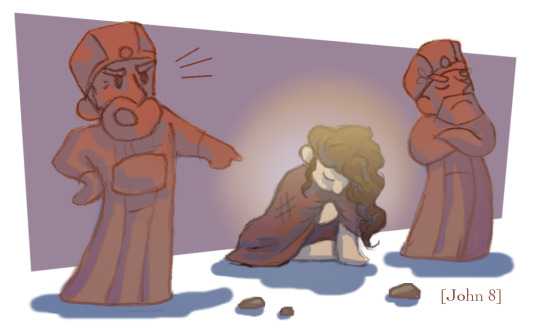
“What!? No!” I thought. “How are we going to punish someone if you clean it up for them? But Anthony didn’t think like that, because he knew who sat on the throne of his life. He demonstrated a kingdom principle that day which has stuck with me ever since. It’s all over the bible, but sometimes you have to see it in action before it sinks (or in this case, flushes). He demonstrated grace. With a servant’s heart, he covered someone else’s mistake by cleaning up their mess, without the need for punishment or retribution. Nobody got in trouble. Nobody was publicly shamed. The issue was solved, and we went on our merry way without further incident. I didn’t say anything at the time but I was deeply impacted by that moment. That kind of attitude only comes from one person. The apostle John says, “Jesus, knowing that the Father had given all things into his hands...rose from supper...Then he poured water into a basin and began to wash the disciples’ feet and to wipe them with the towel that was wrapped around his waist.” Later on, Jesus explains what he’s doing. “If I then, your Lord and Teacher, have washed your feet, you also ought to wash one another’s feet. For I have given you an example...” [John 13:1-15]

Jesus solved problems that weren’t his and he freed people with forgiveness. He did, and still does, prefer mercy over immediate punishment. And he prioritizes relationship, removing walls that divide us with the goal of peace and reconciliation. He’s not out to punish us; he wants us to experience his love. So instead of coming at us with retribution, or keeping a grudge-list, He nailed our offenses to the cross and cleaned up the mess we made. Through his forgiveness, I’m free to relax and trust that he likes me, wants me around, and that I won’t end up in the doghouse for my numerous, numerous mistakes. Thank goodness. He expects us to do the same. Since He forgave me of my sins (aka, criticism, judgment, and mis-applied justice mentalities) how much more can I forgive my brother who pees on the seat? (Jesus died for that too, by the way). I want my first instincts to be to forgive and resolve. Forgive wrongdoers their wrongs and resolve problems without making a scene. I want to be someone who brings freedom and grace rather than justice and law. That’s what Jesus did, and we love him for it. [John 1:16-17] It was easy that day to see who sat on the “throne” of Anthony’s attitude. Whether it’s before the white throne of judgment, or the porcelain throne of grace, I want my character to represent Christ’s. So next time, I’ll just clean it up.
#Where Sin abounded#GRACE abounds all the more#Romans 5:20#There ended up being a lot more potty jokes than I originally intended.#Lol#No complaints#Grace#Word in Action#Forgive and Resolve#Just clean it up#Geez I'm like a pharisee#It's so tempting to impulsively buy things you don't need#Like video games#and 6" miniature fantasy figures#But then you remember that it's a bad idea without a consistent source of income#So you don't buy it#but you put it on the list for when you have a job#and you can have nice things again#content#Jesus provides#but its good to be wise.#Happy Tuesday!
0 notes
Text
“Isn’t He Beautiful”
So today I decided to post some lyrics from a song I wrote a few months ago. My aim in writing this was to summarize some of the remarkable points of Jesus’ ministry and articulate an appropriate response for us to have based on what we read of Him. I’ve received good feedback from it, so here are the lyrics. Be blessed! (or else) Isn’t He Beautiful Verse 1 He heals the blind and touches lepers He spends his time with rejects and losers He invites all the women to stay in the room where he teaches He loves how the children play; he said, “theirs is the kingdom” Oh isn’t He beautiful Oh isn’t He beautiful Verse 2 He feeds the poor and cares for orphans He laughs with friends and shares his secrets He came here to show us the way to live life with our Father With hope and a smile He prayed for our family reunion Oh isn’t He beautiful Oh isn’t He beautiful Chorus See how he’s gentle and sweet He’s kind, he’s so humble and meek Oh isn’t He beautiful See how he’s strong and he’s wise He’s fierce, there’s a burn in his eyes Oh isn’t He beautiful Verse 3 He came to die for sinners To triumph over our idols and pretense Facing death he was bold and brave when they crucified him After three days he rose from the grave and he took us all with him Oh isn’t He beautiful Oh isn’t He beautiful Bridge(?) The more that I find out The more I fall in love The more that I find out The more I just adore Him
#original song#yeah I play music#And write it!#Let me know if you want to buy the digital download of the album that this is on for $10!#It's not a lazy post#It's an easy post#....right#Also there's actually no or else#I was kidding about that#Happy Tuesday!#Good luck in school don't cheat on your map quizzes#I did that one time#scarred me for life#never again#Isn't He beautiful?#Oh isn't He beautiful?
0 notes
Text
Facebook Prayers
One of my biggest pet peeves.
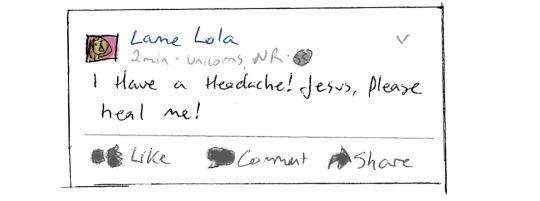
In the days of social media, where we’re encouraged to share the intimate details of our lives in extremely non-intimate settings, it’s common to see well-meaning christians make their intimate prayer life go viral. In our efforts to be genuine, to accurately represent our values, spirituality, and personalities online, we basically just project our inner thought-life onto the screen of social media platforms. And why wouldn’t we? After all, that’s what they’re designed for!
This may come across as a mean rant here, and this time I won’t apologize for it. I love you, I want the best for you, please hear my heart when I point out that you gettin’ crazey, okhay? Alright. Real talk. In my honest (as usual) opinion, Facebook is just not the place to post your prayers. Even prayer requests put me off. Let me explain. Jesus’ functional description of prayer goes like this: “When you pray, you must not be like the hypocrites, who love to stand and pray publicly, that they may be seen by others...But when you pray, go into your room and shut the door and pray to your Father who is in secret. And your Father who sees in secret will reward you.” [Matthew 6:5-6] Simple, right? The Prayer Post According to that verse, it’s hypocritical to blast your personal prayer life in public settings. It’s self-indulgent, self-glorifying and attention-seeking. In truth, it’s cheap “spirituality” designed to make you look good, not to glorify God’s powerful ability to answer prayer. When you’re really praying the way Jesus taught, in a private one-on-one with the Lord, there’s no need to post those things online anyway. Using social media to replace a healthy prayer-life indicates a lack of genuine connection with Christ, and that breaks my heart. How can he answer prayers that aren’t directed towards him? How can you know how much he loves you if you’re “texting to a phone number he doesn’t have”? If you are in the habit of posting things like this online, stop it. It makes you, and consequently Jesus, look bad.
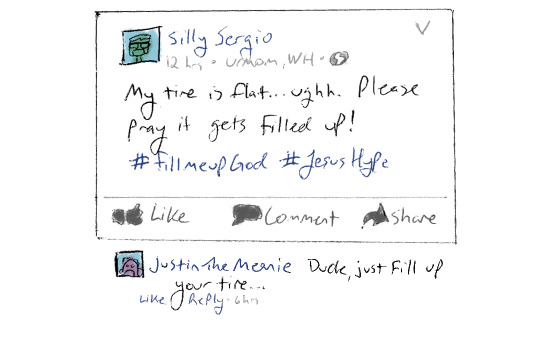
The Prayer Request I have two problems with this. 1) Why aren’t you making a real connection! Reach out to real people. Get connected to your church! Where are your actual friends? We have cell phones, if you have an immediate prayer request then call someone! Call me, I’ll listen to all your problems, tell you you’re being crazy, then pray for you right then and there on the phone! Boom! Don’t turn your (probably) legitimate needs into bait to see what you can “catch” in answers (which is really just you finding out “who actually cares about me”, not seeking the will of Christ). That’s wrong and manipulative. Trust the church to be genuinely helpful. Reach out to a real person, in private, to get your legitimate needs met, and watch God really come through for you. 2) How in the world will you know when the prayer is answered? If your vague request is floating around the cybernetic aerospace of “online”, at what point will you know that God has responded? Did you know that God will actually answer specific prayers specifically? He wants to be glorified in the answered prayer [John 15:7-8]. There’s no basis for marveling at God’s goodness if there’s no place in the real world for him to demonstrate that he heard you. It’s all about God’s goodness anyway.

Pray the way Jesus taught. It works better, it makes God look better, it makes you look better (less whiny, less fake-spiritual), and it’s just all around better to do it the way he said. Don’t be a hypocrite. Keep your prayers in your prayer-closet, not on your Facebook wall.
#rant#seriously cut it out#It's not actually prayer if you're not talking to God#God answers specific prayers specifically#That's gonna be another blog post#Biblical Prayer#Real Connection#and True Spirituality#I love you#forgive me if I hurt your feelings#Don't feel bad#Don't apologize#Just repent#There's a better way to pray#Ohhh say can you seee#By the dawn's early light#What so proudly we hailed#at the twilights last gleaming#When you wish upon a star#It makes no difference who you are#because NOTHING HAPPENS#Stars don't respond to wishes#They are giant balls of fire#But God responds to Prayer#Don't wish upon a cyber-star on Facebook#TALK TO GOD#Too many hashtags#Ive made my point#Sorry#Matthew 6:5-6
1 note
·
View note
Photo

The closeup of my Profile pic. :D lol
0 notes
Text
Jesus the Worship Leader Cont’d...
“What is worship and why do we do it?” I was asked by one of my students last week. Yikes. That’s a big question, and one which honestly caught me off guard. “And keep the answer simple, like you were explaining it to someone on the street.” ....right. Thankfully, she spent some time explaining her question so I had time to formulate a response. While there’s much more to it than just this, here’s the answer I gave her. “What Is Worship?” The most basic building block of worship, the “atom” if you will, is simply to tell God who he is. Jesus said, in John 4, that the Father is looking for those who will worship him in Spirit and in Truth. Every time I read something in the bible that is true of God [ex- “The Lord is my shepherd” Psalm 23], and repeat it back to him [ex-"God, you are my shepherd!”], it’s worship. While there are a multitude of ways to express truth back to God, you can’t remove truth from worship and still call it “worship”. So we celebrate the reality of God’s character in worship by telling God who he is. When we tell God who He is, his Spirit “bears witness” to our heart. He shows up to confirm our declaration, saying, “Yes, I am your shepherd!”. In other words, God reveals God to us in worship. [2 Corinthians 4:6] Which brings me to the second part of the question I was asked; “Why do we do it?” Now I have a two-fold answer. The first reason that we worship is simply because He is worthy. If we were to stay silent, the rocks would cry out with praise instead, because He is so good, so holy, so beautiful, and so worthy of worship. All of creation worships him for the sake of his absolute worthiness. That’s reason number one. The second reason is more profound, as it highlights something unique to how humans worship. Jesus is God [Romans 9:5], and he worshiped by celebrating the revelation of God, the “unveiling” of the Father’s goodness, to his children [See my last post on this topic]. When we follow Jesus we begin the process of becoming like him who was the perfect example of redeemed humanity. .....that sounds needlessly complex, doesn’t it? I’ll state it bluntly: We worship because Jesus does. Boom. That’s it. We become more like God when we do what God does. And that’s what God wants; for us to become more like his son Jesus. The transformation process happens while we worship in spirit and truth.
Worship is about knowing God more and becoming more like Him. I’ll keep expanding on this, but this is the continued “growth stage” of this thought process. Thanks for keeping up!
#All of my former hashtags were oddly displaced and I don't know why....#So you'll have to go find the bible verses yourself. Sorry#Happy Friday!#Worship#Jesus the Worshiper#Fascinating development!
0 notes
Text
REPENT!!

That’s right. The capital “R” word that bible-thumpers and old timey fire-and-brimstone preachers throw at people on the sidewalk. It has a bad rap... But I fell in love with it when I found out that repentance was the core of Jesus’ message. The gospel of Mark summarizes the thrust of his ministry in chapter 1: “After John [the baptist] was arrested, Jesus came into Galilee proclaiming the gospel of God, saying “The time is fulfilled, and the kingdom of God is at hand; repent and believe in the gospel.” Woah! Repentance wasn’t just something John the Baptist preached to get people ready for a “messianic invasion”. And it’s not just something religious fear-mongers use to scare people into salvation (though sometimes that happens too, unfortunately). The message of repentance is what the Messiah himself proclaimed as the Good News of God! If Jesus, who is only good, who perfectly represents the character and desire of God, and who loved us so much that he died on our behalf to give us eternal life and freedom, embraced this message of repentance, then I can embrace it too! Here’s what I love about it...

(Oh, John the Baptist. What a guy.) In repentance, God honors our decision to believe him by empowering us to obey him. By default, humanity is stuck in sin. We were hopeless, helpless, and destined for damnation until Christ came and gave us another option: to live instead of die. [See Deut 30:19-20 and Ezekiel 18 for the old testament precedent]
Instead of coming in force, or coercing us to bow in fear and trembling, or bullying us into submission, he comes with a gentle yet powerful offer: to transform us from the inside-out if we say “yes” to believing and trusting him. He asks us to consider our lives, count the cost and make a decision. When we decide to take him up on that offer, he sponsors our decision by giving us his Spirit, enabling us to fulfill his “righteous requirement” [Romans 8:3-4]! He gives us the ability to get unstuck!
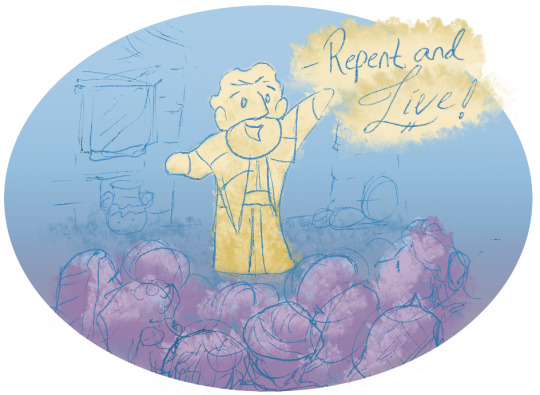
That’s so honoring. It’s honoring of him to let us take the first, practical little baby step into eternal life, which is simply to stop doing bad things our way, and start doing good things His way. So repent! Make a change! Do the right thing! Don’t stay broken! Don’t stay dysfunctional! Partner with His Spirit to change the way you think, act, and make decisions. Say “Yes” to the Son of God, who nailed your sin to the cross and extends to you the option to live an abundant life of joy, freedom, and redemption.
And that’s the message of repentance! Hardly as scary as it sounds, right?
We don’t have to shy away from, or apologize for, this beautiful message in our presentation of the gospel. It’s certainly challenging and sometimes uncomfortable, but it really is good news. Even to vipers...
#REPENT OR BURN#REPENT YOU VIPERS!#.....Or how about Repent and Live!#Aww thanks Jesus!#This post LOOKS longer than it is because of the pictures#While I was working on this#the loudest bird ever was yelling somewhere outside#Maybe trying to find his friend#Or his lunch#Or maybe he was preaching fire and brimstone?#I wonder if birds preach...#Next time you hear an ugly bird yelling at you#REPENT!#FOR IT WON'T SHUT UP UNTIL YOU DO!#Just kidding thats weird...#Lunch time#Happy Thursday!!
1 note
·
View note
Text
Jesus the perfect....worship leader?
This is a recent and still embryonic thought, so I haven’t come to any conclusions yet. I’m excited to see where this goes. I’ve been a worship leader for about seven years. My role in church has always been connected to serving on the worship team in some capacity. It’s what I do. As you can probably imagine, the topic of “worship” comes up a lot. Everyone has their own definitions and experiences which make the culture of worship very rich and engaging. I love being a part of the conversation. Let’s explore a vein of thought relating to this subject which I hope is challenging for both of us. It occurred to me recently that while it’s pretty easy to see Jesus as the perfect teacher, perfect pastor, perfect prophet, perfect evangelist, perfect Israelite, and even the perfect father figure, I’ve never heard anybody talk about Jesus as the perfect worship leader. A lot of congregations emphasize musical worship as an important part of their corporate services, but I’ve never heard it laid out how Jesus is the perfect model for it. While everyone has their own definitions and experiences, my personal goal is to examine the life of Christ as the pattern for mine. Since following the perfect role model will impact every part of who I am, that includes, oddly enough, leading worship. Who knew? Luke 10:21 says of Jesus, right after his disciples came back from a mini-mission trip, “[that] he rejoiced in the Holy Spirit and said, “I thank you Father, Lord of heaven and earth, that you have hidden these things from the wise...and revealed them to little children; yes Father, for such was your gracious will.” The word “rejoiced” jumped out at me one day. Jesus rejoiced; he worshiped! Something inside of him leaped with joy, he got excited, and out came praise to his most favoritest person ever: his Father. It’s like, if Jesus had just popped a zit, worship is apparently what came oozing out!! (....sorry.) And the subject of all this excitement was the way his Father got what He wanted. “Thank you for showing them who you are! Thank you God that they understood! You got exactly what you wanted! Hallelujah!” So if this is an example of Jesus worshiping, then Jesus’ working definition of worship was to celebrate the active will of the Father. In another place, John 4:23 to be precise, Jesus explained that God is looking for those who will worship in Spirit and in Truth. I think the aforementioned passage in Luke beautifully demonstrates what he meant by that. This is what made Jesus rejoice in the Spirit. I want to be concerned with the same things. I want to understand why he was so thrilled. I want to get in on this, so that I can recognize and celebrate the will of God being demonstrated in peoples’ lives. I want God to have what he wants, and I want to be just as excited about it as Jesus was. It’s taken me seven years to figure out that worship is more than a song on a Sunday morning. It’s a partnership with God’s desire to bless his people. This will take us places. How exciting!
#He LOVES to give the Kingdom to his children!#Luke 12:32#He LOVES it when we operate in the authority and grace that He's extended to us!#Luke 10:17-24#He LOVES having mercy on us!#Matthew 9:13#He LOVES honoring our pursuit of truth and relationship!#Hebrews 11:6#He LOVES sponsoring our good works by answering prayers!#John 15:16#He LOVES it when we get along with eachother#Galatians 6:10#I could come up with so many things....#Definitely revisiting this topic later#Zits-for-Metaphors#Oh lordy...#I'm so hungry I could eat my own beefy calf muscle#seriously#I'd be full#I have weirdly muscular calves.#Oooooookay BYE#Worship#Jesus the perfect...#fill in the blank?
1 note
·
View note
Text
He Does What He Wants.
There’s an odd little phrase floating around in my beloved church circles which goes like this: “God, I give you permission to interrupt my day”, and its corporate version, “Lord we give you permission to come and do what you want to do!” The heart of it is so good; “God, I don’t want to get in the way, and I know you’re full of surprises, so let me make room in my head and heart for your will to be done!” I’m not unduly offended by it and I would never ever correct my friends for saying this phrase in public prayer. It’s not that big of a deal. But I am going to make a point about it and gently offer a course-correction. Now, I’m not sure where it came from (it’s not anywhere in the bible) or who started it, but I must say I think the phrase is redundant at best, inappropriate otherwise. It’s useless, it doesn’t mean anything, and it feels misinformed. Last year, I had a startling, 2-part epiphany concerning this phrase, and this is why I bring it up. I used to put a lot of pressure on myself to make sure God had space in my life. I felt guilty when I couldn’t feel him, when I wasn’t “connected”, or if I prayed for healing and it didn’t happen, etc. This is how God broke through that pressure. 1) God doesn’t need my permission, and I couldn’t stop him anyway. He does what he wants. Literally... Isaiah 14:24 & 27 says, The Lord of Hosts has sworn, “As I have planned, so shall it be, and as I have purposed, so shall it stand...” Who can change his plans? His hand is stretched out, and who can stop him? When I was a baby, I never gave my parents permission to feed me, wash me, clothe me, or otherwise do the things good parents do. I let them know what I needed, and they faithfully took care of me because they loved me. They did good things for me even when (sometimes especially when) I didn’t like it. How much more, then, am I incapable of hindering God from loving me? It’s silly for me to presume that my authority and/or ability, or the lack thereof, could keep God from doing what God intends to do. Now that doesn’t leave me entirely out of the equation. The second thing I realized is that 2) While I can’t stop God, I can choose which side I’m going to be on when He moves. This was the core of Jesus’ simple message when he began his ministry. ”Repent, for the kingdom of heaven is at hand!” [Matthew 4:17] In other words, God is about to move whether you like it or not, and you have a choice to make!
So while I have grace for those who use this strange phrase, I’ve changed my own personal attitude. Now, instead of granting him permission, I simply ask him to demonstrate his love: “God, you’re in charge here! Come and do what you love doing. You delight in mercy, so have mercy! You delight in freedom, so free us! You love healing, so heal! Let your kingdom come, and your will be done here.”
#Potentially confrontational#But I love you!#And I'm really not here to condemn#I won't throw this in your face#So instead I'll write a passive aggressive blog post...lol#Isaiah 14:24 & 27#Matthew 4:17#There's a better way to pray!#Ask and you shall receive#Repent for the kingdom is at hand#Hashtags#I have friends over and its hard to focus on clever hashtags....#They helped me proof-read#and encouraged me to continue writing!#I love the church#Okay enough hashtags
0 notes
Text
The Alternative.
I’m so excited for this! Ever since this post, I’ve been wanting to share my alternative reaction to brokenness in the world. It’s hardly fair to take away one without offering a replacement. I think a common experience in our faith, especially in the west, is to get so wrapped up in the pursuit of purity and correct thinking (both noble ventures), that we forget our mission. Or rather, Christ’s mission: “For the Son of Man came to seek and save the lost.” [Luke 19:10] “Go therefore and make disciples of all nations, baptizing them in the name of the Father and of the Son and of the Holy Spirit.” [Matthew 28:19]
When we agreed to surrender our lives to Christ’s lordship, when we got “saved”, we simultaneously signed up for His mission to bring God’s gospel of redemptive love to a lost and broken world.

I was reminded of this a few months ago, when I realized that I can’t be effective in this mission until my heart aches for the lost. My prayer since then has been, “Break my heart for them, God! Don’t let me harden my heart to their pain.” Offense moves me away from sinners, people who need God’s love. It compromises the mission! I refuse to be offended by sinners so I can move towards them with compassion, like Jesus did [Matthew 9:36].
Not being offended frees me to be moved by mercy. It frees me to take initiative and get closer to people in the midst of their struggle. I don’t have to fix them, I get to forgive and love them. I don’t have to shield myself from their “dirtiness”. I can embrace them with all their mess, the way God embraced me in my mess. Obeying the call to this mission means not being offended. It means forgiving, and being available to the ones who need to see God’s compassion demonstrated...

...no matter who ‘those ones’ may be.
#Oooh see what I did there?#I illustrated a point so I didn't need as many words!#Literally illustrated it#I decided words aren't enough.#Since I think with pictures#I can better make my points with pictures#And it'll be more interesting#I gotta figure out how to simplify these drawings....they're way more complex than they probably need to be#God is on a Mission#Love with an Agenda#Luke 19:10#Matthew 28:19#Matthew 9:36#Love your enemies#Don't be offended#It will compromise the mission#Love the Lost#Love the Offended#Don't hide from pain#Tuesday Post#I sat in a box yesterday#It was awesome.
0 notes
Text
Weird Word Wednesday...on Tuesday!
“Panacea.” It’s in that lion king song: “Paaaaaanacea love toniiiiiight...”
...right? Eh? Ehhhh? yeah.
#it's not that funny#I came up with this late at night last week#I've been waiting til Wednesday to post it#You're welcome#Why? is what you're asking#Well this blog is about my thoughts.....#soooooooo here you go.#Happy Wednesday#On Tuesday
0 notes
Text
Babylon 5? Where’s Babylon 1?
There’s a strange story in Genesis, chapter 11, that describes a unified effort by man, after the flood, to build a towering civilization which would exalt the reputation of its builders [verse 4]. God apparently takes interest in the endeavor, referred to as “Babel”. He mysteriously thwarts the construction of this tower by “confusing their language.” This is where humanity stopped speaking ‘english’. :P (just kidding, I don’t know what language they spoke, but we don’t speak it now!) Without any context, or background in Old Testament studies, this passage can be confusing. But let’s take a few steps back to see this theme in the “big picture”, where this tower of Babel represents the endemic problem of human evil and becomes the first instance in an ageless pattern: Humans build an impressive and blasphemous empire, always marked by elitism, injustice, vanity, and selfish ambition, but God, faithfully good and just, orchestrates its downfall. Over and over, the story is the same. It happened Egypt. God wrecked them with signs and wonders while freeing his enslaved people. It happened to Babylon (#2 as it were). God took them out with Persia, restoring Israel’s freedom to live in their land. It happened to Rome. Turns out the Eternal City wasn’t so eternal after all...though it is a nice vacation spot. It’s the same every time. Since Jehovah is a good god, He refuses to let human wickedness win out in the end. It’s in His name! [Exodus 34:6-7] This promise of God to ultimately triumph over human wickedness is fundamental to how the Jews understood their scriptures and prophecies during exile in (you guessed it) Ancient Babylon and thereafter. The same archetypal theme was encouraging to the First Century Church during intense persecution by Imperial Rome, allowing them to embrace their radical and rebellious faith in Christ by trusting God for an ultimately good and worthwhile outcome. [side note: the book of Revelation uses the term “Babylon” to represent the Roman Empire. Far from being a magic-eight ball about the future, it’s ultimate message is timeless; human pride loses, God wins every time.] As we’re facing a culture that becomes increasingly intolerant of truth-based values (ironic, right?), let’s not be surprised by how “dark” the world appears. Sin is no news flash to God. Babylon has worn a thousand faces, with a thousand names, in a thousand places. Jesus, faithful and true, has already conquered it all on the Cross. His plan for wiping out corruption on the earth is already well under way, and in the end our song will be “Fallen, fallen is Babylon! The smoke from her goes up and up. Hallelujah! For the Lord our God the Almighty reigns.” [Revelation 18 & 19] So hang tight! Stay faithful to Christ, hold true to the faith, and keep loving like it’s the only thing that matters. No matter how many “Babylons” come and go, God’s victory is a sure thing, and I sure don’t want to be on the wrong side of the battle lines when the pattern repeats itself in our generation.
#This is what I think about late at night...#Prophetic Literature applies this theme beautifully and thoroughly#See Daniel#Ezekiel#Isaiah#Revelation#most of the minor prophets#etc.#Even Jesus brought it up#Matthew 24-25#I have more to say about this#I'll return to the topic later.#Probably#I try to keep these posts short and digestable#Unlike the hashtags.#So yeah Revelation is NOT about the End of the World#It's about the end of Human Wickedness.#Do yourself a favor and keep that in mind when reading prophetic literature#It'll clear up a lot of confusion.#Just believe in Jesus and do what he said to do while we wait patiently for him to come back#Okay hashtag overload#Over and Out
0 notes